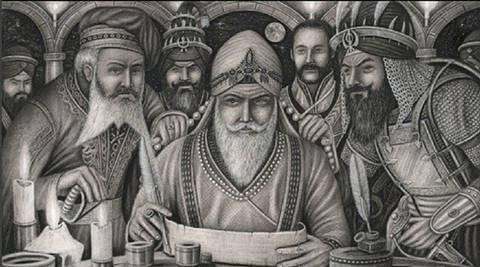Muslim accounts:
The mid 19th-century Muslim historians, such as Shahamat Ali who experienced the Sikh Empire first hand, presented a different view on Ranjit Singh's Empire and governance. According to Ali, Ranjit Singh's government was despotic, and he was a mean monarch in contrast to the Mughals. The initial momentum for the Empire building in these accounts is stated to be Ranjit Singh led Khalsa army's "insatiable appetite for plunder", their desire for "fresh cities to pillage", and entirely eliminating the Mughal era "revenue intercepting intermediaries between the peasant-cultivator and the treasury".
According to Ishtiaq Ahmed, Ranjit Singh's rule led to further persecution of Muslims in Kashmir, expanding[clarification needed] the previously selective persecution of Shia Muslims and Hindus by Afghan Sunni Muslim rulers between 1752 and 1819 before Kashmir became part of his Sikh Empire. Bikramjit Hasrat describes Ranjit Singh as a "benevolent despot". The Muslim accounts of Ranjit Singh's rule were questioned by Sikh historians of the same era. For example, Ratan Singh Bhangu in 1841 wrote that these accounts were not accurate, and according to Anne Murphy, he remarked, "when would a Musalman praise the Sikhs?" In contrast, the colonial era British military officer Hugh Pearse in 1898 criticised Ranjit Singh's rule, as one founded on "violence, treachery and blood". Sohan Seetal disagrees with this account and states that Ranjit Singh had encouraged his army to respond with a "tit for tat" against the enemy, violence for violence, blood for blood, plunder for plunder.
The mid 19th-century Muslim historians, such as Shahamat Ali who experienced the Sikh Empire first hand, presented a different view on Ranjit Singh's Empire and governance. According to Ali, Ranjit Singh's government was despotic, and he was a mean monarch in contrast to the Mughals. The initial momentum for the Empire building in these accounts is stated to be Ranjit Singh led Khalsa army's "insatiable appetite for plunder", their desire for "fresh cities to pillage", and entirely eliminating the Mughal era "revenue intercepting intermediaries between the peasant-cultivator and the treasury".
According to Ishtiaq Ahmed, Ranjit Singh's rule led to further persecution of Muslims in Kashmir, expanding[clarification needed] the previously selective persecution of Shia Muslims and Hindus by Afghan Sunni Muslim rulers between 1752 and 1819 before Kashmir became part of his Sikh Empire. Bikramjit Hasrat describes Ranjit Singh as a "benevolent despot". The Muslim accounts of Ranjit Singh's rule were questioned by Sikh historians of the same era. For example, Ratan Singh Bhangu in 1841 wrote that these accounts were not accurate, and according to Anne Murphy, he remarked, "when would a Musalman praise the Sikhs?" In contrast, the colonial era British military officer Hugh Pearse in 1898 criticised Ranjit Singh's rule, as one founded on "violence, treachery and blood". Sohan Seetal disagrees with this account and states that Ranjit Singh had encouraged his army to respond with a "tit for tat" against the enemy, violence for violence, blood for blood, plunder for plunder.
Muslim accounts:
The mid 19th-century Muslim historians, such as Shahamat Ali who experienced the Sikh Empire first hand, presented a different view on Ranjit Singh's Empire and governance. According to Ali, Ranjit Singh's government was despotic, and he was a mean monarch in contrast to the Mughals. The initial momentum for the Empire building in these accounts is stated to be Ranjit Singh led Khalsa army's "insatiable appetite for plunder", their desire for "fresh cities to pillage", and entirely eliminating the Mughal era "revenue intercepting intermediaries between the peasant-cultivator and the treasury".
According to Ishtiaq Ahmed, Ranjit Singh's rule led to further persecution of Muslims in Kashmir, expanding[clarification needed] the previously selective persecution of Shia Muslims and Hindus by Afghan Sunni Muslim rulers between 1752 and 1819 before Kashmir became part of his Sikh Empire. Bikramjit Hasrat describes Ranjit Singh as a "benevolent despot". The Muslim accounts of Ranjit Singh's rule were questioned by Sikh historians of the same era. For example, Ratan Singh Bhangu in 1841 wrote that these accounts were not accurate, and according to Anne Murphy, he remarked, "when would a Musalman praise the Sikhs?" In contrast, the colonial era British military officer Hugh Pearse in 1898 criticised Ranjit Singh's rule, as one founded on "violence, treachery and blood". Sohan Seetal disagrees with this account and states that Ranjit Singh had encouraged his army to respond with a "tit for tat" against the enemy, violence for violence, blood for blood, plunder for plunder.
0 Commentarios
0 Acciones
0 Vista previa




